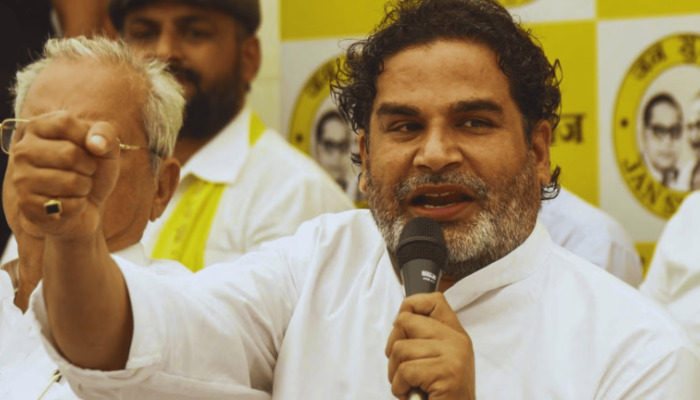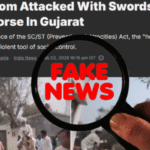The election campaign has commenced in Bihar with both primary alliances, Mahagathbandhan and National Democratic Alliance actively engaged in preparations for the electoral battlefield. On the other hand, former election strategist Prashant Kishor is striving to establish a third front through his newly formed “Jan Suraaj” party. He has even adopted a confrontational approach in a bid to set himself apart from the two dominant blocs.
Prashant Kishor is vigorously challenging all opponents. He is also assertive regarding his poll campaign and is gearing up for the polls. He has declared that he will be the first to announce his party’s candidates in Bihar. The election dates have been confirmed, yet the names of his candidates remain unknown. However, leaders and activists of Jan Suraaj have already begun to clash over nominations.
Jan Suraaj: promises vs realities
When Prashant Kishor, the architect of Jan Suraaj, announced its launch, he claimed to foster the most democratic structure within the party and made similar statements on multiple occasions. He also insisted that the candidate selection process would be completely transparent.
Prashant chose to select candidates based on the preferences of the public, to present his party as democratic. It was decided to seek public input on this matter. The party created “Candidate Suggestion Forms” which feature the names of several potential candidates for each constituency. Citizens had to express their opinions and then vote for the Jan Suraaj candidate they supported.
While Jan Suraaj wanted to demonstrate the party’s commitment to democracy via these forms, they unveiled the existing mob mentality within the party. These led to disputes between supporters of various candidates in various parts of the state. The distribution of an excessive number of forms to supporters of a single potential candidate led to uproar in some areas while at other places, members of the party were seen filling out forms in the name of their favorite candidate inside closed spaces.
A viral video from the Aurai assembly constituency in Muzaffarpur has surfaced on social media, showcasing three or four individuals seated in a room completing numerous forms for their preferred candidate. Furthermore, they openly acknowledged their support for the person they were endorsing. Allegations have arisen that the forms are not being delivered to the public and prospective candidates are putting their own names in them, since the release of the footage.
When the videographers posed questions to the people filling the forms in the room, they brazenly replied, “The public lacks awareness, thus we are undertaking this task ourselves.” They were in the process of stamping around 300 forms.
अध्यक्ष जी,आपका प्रत्याशी खुद अपना वोट अपने कार्यकर्ताओं से डलवा कर खुद प्रत्याशी बन रहे हैं। जनता को मौका ही नहीं दिया जा रहा है प्रत्याशी चुनने का।
यह वीडियो मुजफ्फरपुर के औराई विधानसभा का है। @ManojBhartiJSP https://t.co/TNLkQfPuZJ pic.twitter.com/yL6RsQd01l— The Bihar (@thebiharoffice) October 6, 2025
This incident is not isolated. It has occurred in different locations and has become increasingly prevalent. A similar situation was reported in Darbhanga where chaos transpired during the candidate selection process. A conflict over signatures on ballot escalated into a brawl with workers throwing chairs at one another. Several individuals were injured as a result.
A ruckus was observed in Benipur where people complained that they had not been given papers. They also charged that rigging was taking place. A person mentioned that several bundles were provided to the supporters of a candidate. Insults were also exchanged. Another individual stated that some people were handed over six papers each while others were not receiving even one.
Unrest also broke out concerning the voting at the convention of Jan Suraaj workers, in Bisfi. The party nominated Nagendra Yadav, Mohammad Kaleen and Vashishtha Narayan Jha as potential candidates. Forms featuring the names of all three were handed out to the public, but an altercation transpired among them. The candidates accused one another of hiring goons. It has been reported that Jha was notified beforehand about the voting while the other candidates were not.
Meanwhile, he declared his support for the voting and his willingness to participate. He stated that anyone involved in hooliganism will be treated as a thug. However, the other two voiced their discontent.
Now, this internal division has become the reality of the party. This indicates that Prashant, despite his grand promises has been incapable of establishing democracy within his own political party.
Why the delay in ticket distribution
Jan Suraaj had long ago claimed a strong presence and introduction of “new politics” in Bihar, but when it came to ticket distribution, many layers within the party began to unravel. Despite Prashant’s months-earlier declaration that his party would independently participate in the polls and proceed with ticket announcements, he has yet to fulfil the same. This delay can be attributed to many factors.
The primary reason is that the party knows that its existing support base merely serves as a vote splitter. Numerous party members also recognise that if tickets are allocated and elections are held, the competition is unlikely to progress beyond third or fourth place in most constituencies.
Prashant is probably biding his time for other parties to allocate tickets, allowing leaders or factions discontented with a major party and possessing a robust support base to align with him.
The secondary reason pertains to the locals managing Jan Suraaj’s organization. The entire structure is under the control of those who have been engaged with the campaign since its inception. These workers have conducted surveys in every village, organized meetings and established the party’s foundation. Furthermore, they have also invested financially on the ground.
With the arrival of ticket distribution, they have taken on the role of contenders. Hence, if someone is denied a ticket or is shown preferential treatment, rebellion is a certainty. Meanwhile, Prashant is waiting for the opportune moment to safeguard his party from this revolt. Jan Suraaj claimed to be different, but now it faces the challenge the age-old compulsions in a complex political landscape.
Read the report in Hindi here.













